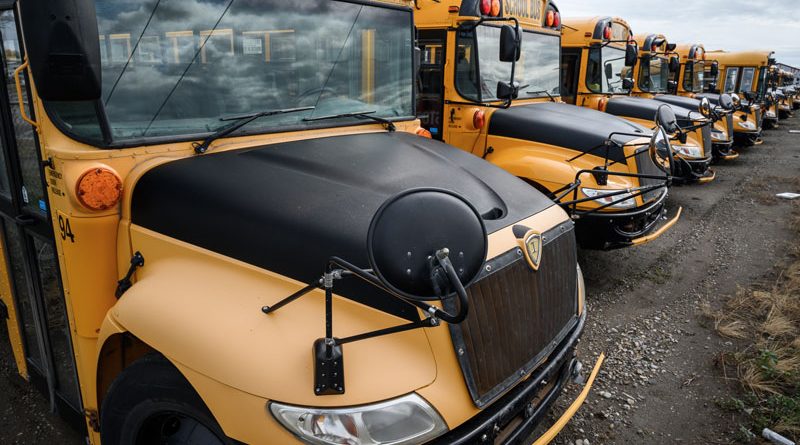The ABCs of homeschooling
By Sean Feagan, Local Journalism Initiative Reporter

Sean Feagan Photo
Concerns over COVID-19 and its impacts has some area parents looking to new avenues for their children’s education this fall.
While the province announced on July 21 that students would be returning to school this fall under “near normal” conditions, some area parents are considering other options for their kids, including home and distance education.
But there is a lot to know.
“Right now, there’s a lot of confusion among parents,” said Judy Arnall, president of the Alberta Homeschooling Association, a non-profit community organization (albertahomeschooling.ca).
Parents who want to teach their own kids must sign up for a home education program, said Arnall. “That’s the legal term – if they ask for homeschooling, some of the schools are sending them to distance education or online, which is not parent controlled.
“When parents sign up for home education, they are taking back responsibility for their children’s education.”
But that does not mean they necessarily have to teach, said Arnall.
“A lot of parents are scared of teaching – they are not confident,” she said. “But they can outsource to tutors, have their nannies facilitate the learning, or a lot of parents are getting together ‘pods’ or ‘micro-schools’ with other parents and sharing the workload.”
If parents want to home educate, they must send a notification form to a school by Sept. 30, or they will lose their own home education funding and support, said Arnall. In home education, parents plan, buy and deliver (or delegate) the education program, and no marks are given.
Across the province, there are about 30 school authorities, including public, Catholic, charter and independent, that accept home education programs. Both online and home education programs are offered by Golden Hills School Division (GHSD) through its (The) Learning Academy (goldenhillslearningacademy.com) and by Christ The Redeemer Catholic Schools through its (The) Centre for Learning@Home (albertahomeeducation.ca).
“But parents don’t have to stick with their local one – they can choose any,” said Arnall. She recommends parents select a program based on the activities the board offers and what it funds. “Parents need to choose based on their child’s best interest.”
But it may not really matter which one parents ultimately pick.
“They all offer the same funding,” she said. “The requirements and all the regulations are the same. It boils down to who the facilitator is that they’re assigned to, and they can always change that through the year if it’s not a good fit.”
Arnall suggests home education is most suitable for children in grades one to six. “It has the most flexibility, and then parents don’t have to put their kids on screens all day.”
If enrolled in its home education program, GHSD provides some supervision, said Superintendent Bevan Daverne.
“There’s a little bit of help setting up the program (and) a little bit of help with resources,” he said.
Arnall believes distance education is more suitable for students in grades 7 to 12.
“Teenagers are fine with the online approach of distance education,” she said. “They have a better attention span – they can read and they can work independently.”
GHSD is currently exploring alternative options for parents currently hesitant about having their child return to school, but who are also not comfortable with either providing home education or having their child in a full year of online schooling.
“We’d like to see how many of those parents and students there are, and it’s possible that we may be able to work out a program that’s in between,” said Daverne.
Whatever parents decide, there’s flexibility in the system, explained Arnall. “If home education is not working out, can they put their kids back into school during the year? The school boards are grumbling that they might not be too receptive. But legally, yes, they can.
“And yes, they can pull their kids out to home educate at any time during the year,” she added. “They just won’t get funding and support.”
While some parents hold a notion that home education does not provide the same opportunities for socialization as regular school, this has not been a concern for Cindy Eisbrenner, who has homeschooled three children for over 18 years.
“We have intentionally incorporated activities where our children could socialize and make friends,” said Eisbrenner, who added there are many community-based activities for children to get involved in, such as karate, dance, skating, cadets and scouts.
Strathmore has a homeschool community that provides opportunities for students to socialize and for parents to gain support. One is the Strathmore Homeschool Park Days, a parent-led homeschooling group that meets weekly at parks in town.
Park Days differs from more regimented activities, explained Rainbow Miller, one of the co-founders of the group.
“We noticed there wasn’t really an area for kids to just socialize freely and for parents to just come ask their questions,” said Miller. “We wanted to create a casual meetup space for parents to talk, ask their questions and compare their notes, and for kids of all ages to just mingle, socialize and create friend groups.”
The group is composed of people from all walks of life.
“Some of them have been homeschooling for 20 years plus, and some are just beginning,” said Miller. “The kids get to mingle with all sorts of ages, all sorts of groups, and they can actually follow their own interests – and families can choose from so many different styles.”
